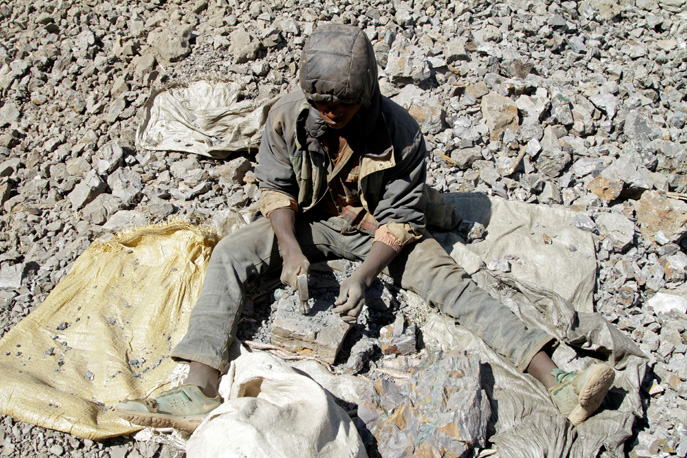Oliver Balch says brands are making strides on integrating recycled plastics in their packaging, but few are innovating to turn off the tap on virgin plastic. He also reports on how climate justice will come to the fore in 2022
Omicron may have hit Christmas sales hard, but high street brands remain keen to use the year’s busiest shopping season to highlight their efforts to tackle the perennial problem of plastic packaging. The European arm of U.S. petfood company Mars Petcare led the way, announcing its intention to start selling its Sheba cat food brand in food-safe recycled plastic containers later in 2022.
The move follows a tie-in between waste company Veolia and cosmetics giant L’Oréal that will see the latter start using low-carbon “pelletised” recycled plastic in its product packaging. Similarly, U.S.-based bag brand Solo New York flagged its removal of 10m plastic bottles from the ocean over the last year (25% of the way towards its 40 million-bottle target by 2024).
Low global oil prices are making virgin plastic increasingly attractive
So, is plastic set to become a ghost of retail past? Unlikely. Low global oil prices are making virgin plastic increasingly attractive, as are Covid-era hygiene fears about plastic reuse, a recent World Bank note warns. Even optimistic viewpoints come with an element of caution. Take the new progress report by environment charity WWF for its ReSource:Plastic initiative. The study calculates that use of so-called problematic plastics (polystyrene packaging, plastic straws, disposable plates and so on) has fallen by 57% since 2018.
At the same time, the report argues that limited availability of recycled content and lack of investment in recycling infrastructure severely hamper the reuse systems of the initiative’s core members, which include McDonald’s, Starbucks, Coca-Cola and Colgate Palmolive.

The Ellen MacArthur Foundation strikes a similar “yes, but” tone. According to the influential advocate of a circular-based solution, use of virgin plastics by big brands is now on a downward trajectory. An assessment by the non-profit foundation of 63 corporate signatories to the Global Commitment ‒ a list that includes Danone, Unilever, PepsiCo and L’Oréal ‒ projects their virgin plastic consumption will fall by 20% by 2025 (compared with 2018), after a peak in plastic use this year.
Many of these participating brands follow the UK Plastics Pact in committing to only using reusable, recyclable or compostable plastic by 2025, the report notes. Even so, there are several stings in the tail.
Important as recycling is, solving the plastic problem is impossible without first taking single-use plastics out of the picture. As Ellen MacArthur Foundation’s eponymous founder puts it bluntly, “we won't recycle our way out of plastic pollution”.
2025 recyclable packaging targets ‘face significant challenges’ because of ongoing dependency on conventional non-recyclable options
Yet current efforts overwhelmingly involve substitution of other plastics or paper rather than reuse of packaging, with fewer than 2% of Global Commitment signatories’ plastics reusable, 56% not investing in any pilot projects to explore reuse models in the past year.
Meanwhile, 2025 recyclable packaging targets “face significant challenges” because of ongoing dependency on conventional non-recyclable options.
Governments can certainly help. From this June, for example, Scotland is set to ban some of the worst contributors to plastic waste, such as plastic cutlery and straws. Much hangs on rule enforcement, however, as seen in the Philippines, where the country’s Supreme Court recently ruled against the government for its long-term negligence of plastic pollution.
One solution is to increase pressure on the buyer side, argues Jenny Turner, a spokesperson for Insulation Express, a UK materials supplier to the construction industry. “Businesses would prefer to use alternative materials to plastic for purposes like packaging,” she says, though high cost currently prevents most from doing so.
Her comments follow government figures showing that the plastic waste output of the UK building industry has increased by over 45% since 2020. Supporting this view is the influential brand-led Consumer Goods Forum, which cites a reduction in business-to-business plastic packaging as one of nine new “golden design rules” for plastic-use reduction.
A more radical solution is to ratchet up governance mechanisms inside plastic companies. If the finance thinktank Planet Tracker had its way, non-executive directors in the world’s largest 20 plastic production firms would have an explicit duty to demand clear transition strategies to cleaner products. Sanctions in their armoury could range from docking the pay of sluggish executives through to removing under-performing board members from office.
“It is entirely reasonable that shareholders (and certainly directors) should have sight of the policies and transition strategy on how these problems are and will be tackled. This will allow investors to judge how to price the risks inherent in these companies,” adds John Willis, director of research at Planet Tracker.
The proposition emerges after a recent report by the non-profit group revealed that the world’s 10 largest plastic brands are responsible for 39% of total single-use plastic production.
Climate justice to come into focus in 2022
Justice issues have long been at the heart of the corporate sustainability debate. Child labour is a classic example, as recently flagged by a Save the Children report concerning artisanal cobalt mining in Democratic Republic of Congo. Land grabs in commodity-rich nations is also high on brands’ supply-side risk list – and not without cause, according to research by risk expert Verisk Maplecroft. Recent years have also seen privacy issues rise to the fore, a concern the United Arab Emirates is seeking to address through a new landmark data-protection law that comes into force in January.
Expect to see the justice lens widen in the year ahead, however. Environmental justice, particularly as it relates to the effects of climate change, is fast becoming a business-critical theme. Why? Because from acute droughts in Kenya to crop failures in Central America, the impact of changing weather patterns and global temperatures are being felt by the world’s poorest communities, a point made repeatedly at the UN climate summit in Glasgow in November.

The disparity between the carbon footprints of low income and wealthy countries acerbates the clear sense of injustice, as highlighted in recent research by anti-poverty campaign group Oxfam, which shows that the lifestyles of the richest 1% of the world’s population exceeds by 30 times the level required to keep within a 1.5C future.
Helping put environmental justice on the boardroom agenda are moves by Amazon founder Jeff Bezos, whose $10bn charitable Bezos Earth Fund recently dispersed its first tranche of grants (worth £443m). The grants explicitly look to advance climate justice and nature protection, “two areas that demand stronger action,” says the fund’s chief executive, Andrew Steer.
The move is not unique. Eco-minded brands such as Natura, Body Shop, and Patagonia have been channelling philanthropic funding to environmental campaigners for years. Yet the general trend until now has been for brands to give publicity rather than cash to eco-justice causes – a case in point being the #Call4ClimateNOW campaign, which sees numerous U.S. consumer brands put their weight behind calls for progressive climate legislation.
One powerful signal businesses could send is to be more transparent about their tax affairs
As the global wealth gap continues to grow, meanwhile, questions of socio-economic justice can also be expected to start gaining greater traction. Income inequality is a tough issue for brands to address, spanning as it does from the local (within national economies) to the global (between nation states).
Yet, one powerful signal businesses could send is to be more transparent about their tax affairs. That’s the verdict of the International Council on Mining and Metals, at least. As part of a trust-building drive, the trade body’s members will reveal what taxes they must pay and when payments are due, on all contracts signed in 2021 and onwards.
“If citizens of resource-rich countries are able to scrutinise the decisions made by governments on their behalf, those decisions are more likely to be to their benefit,” said Maria Lya Ramos, an extractive industry’s expert at Oxfam.
Mars WWF plastic recycling reusable packaging WRAP UK Plastics Pact Ellen Macarthur Foundation circular economy Planet Tracker cobalt mining environmental justice Bezos Earth fund global wealth gap

